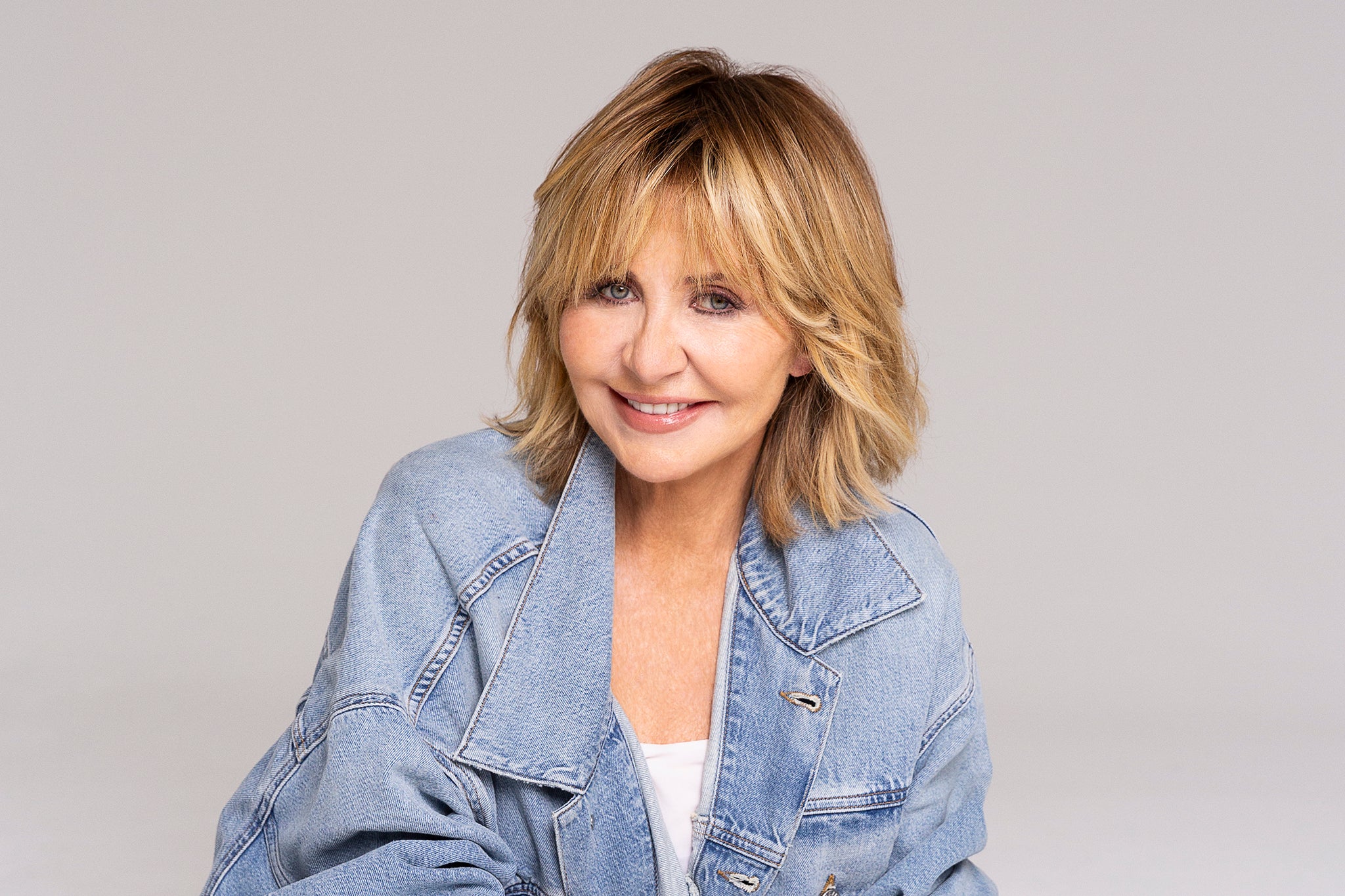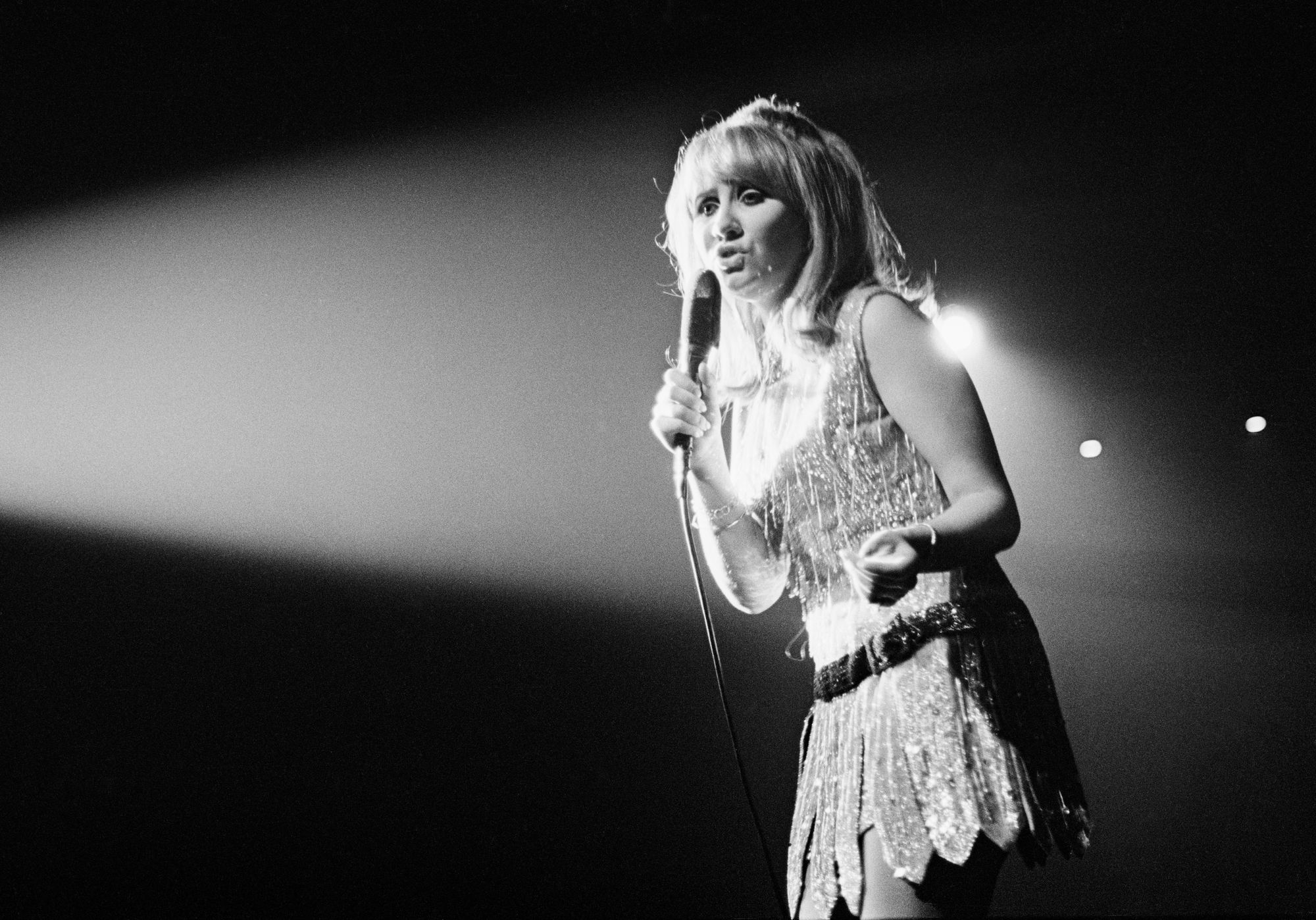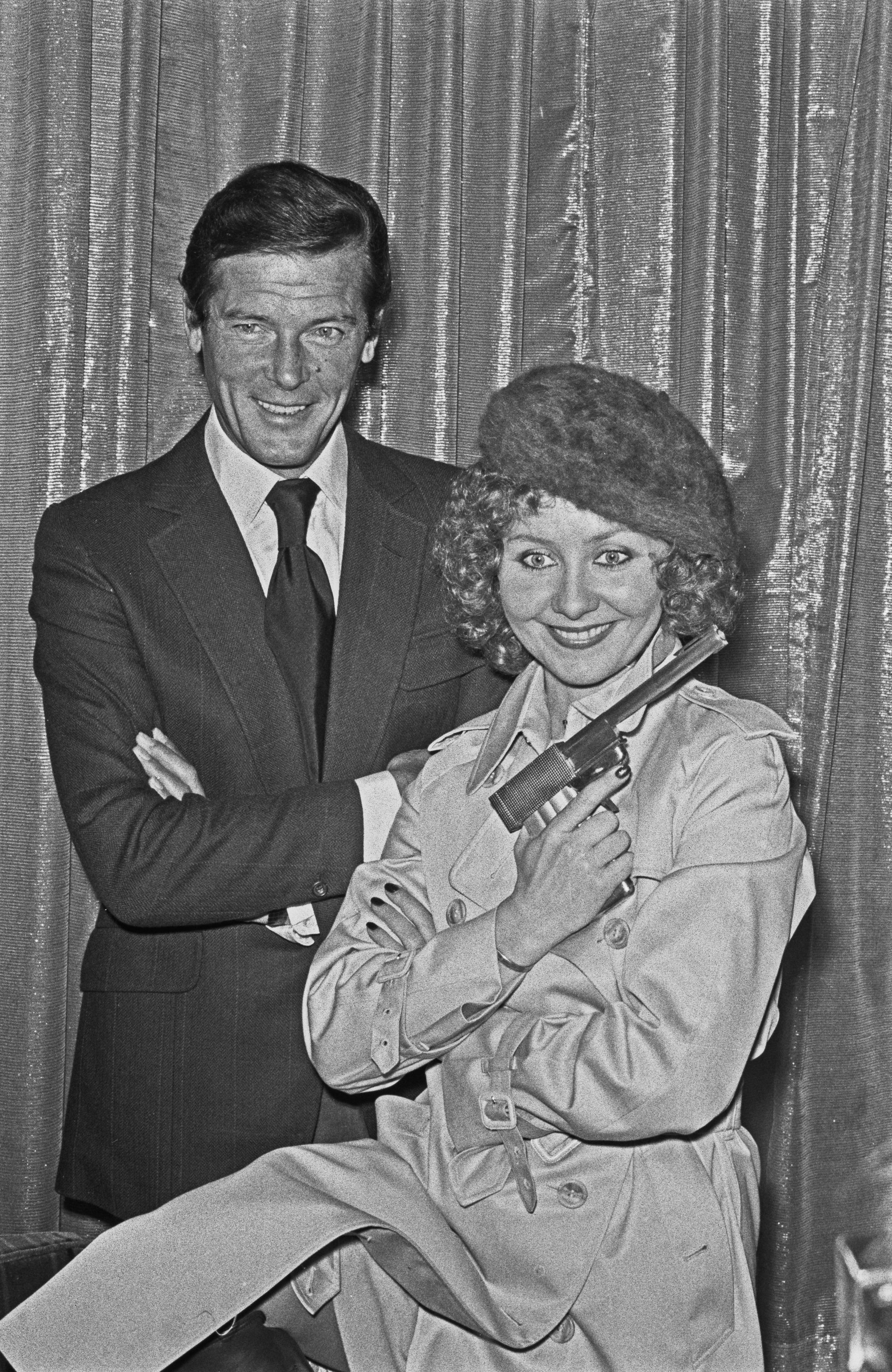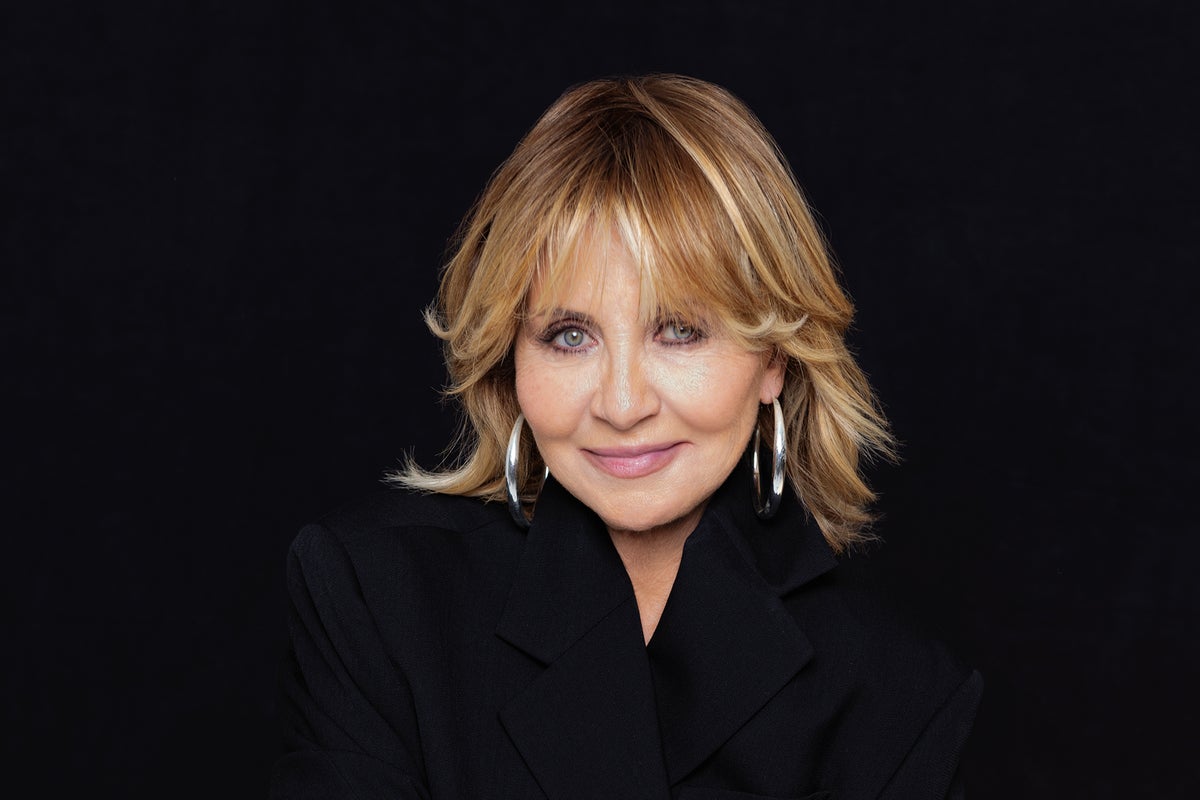I hear Lulu long before I see her. That brawny, cheerful Glaswegian screech barrels down the corridor to the pod-like room where I am waiting at her publicist’s office in King’s Cross a good 30 seconds before she appears. When she blasts through the door, her tiny stature still takes me by surprise, even though it’s well known that she is only 5ft 1in. “I’ve got so much makeup on it’s going to walk off my face in a minute,” the 76-year-old squeals by way of greeting. She’s wearing a punky new wave-style black suit, white socks and loafers, and looks like a teenager from 1982.
We’re meeting to talk about her new memoir, If Only You Knew, in which she sets out for the first time the startling realities behind one of the most enduring and hard-working careers in showbiz. Lulu has been in the public eye ever since her debut single “Shout”, an unruly, adrenaline-fuelled, floor-filling cover of the Isley Brothers, reached No 7 in 1964. She’s released 15 albums, sung the themes to The Man with the Golden Gun and To Sir, with Love, in which she also starred, presented regularly on TV, worked with Take That, briefly reinvented herself as an electronica artist, and last year was one of the hits of Glastonbury alongside Ronnie Wood and Rod Stewart. The three of them looked to be having more fun than most of the acts a quarter their age. For generations of Brits she will forever be the happy-go-lucky girl-next-door pop starlet with the voice of an American soul diva whose career has become a byword for breezy, cheesy middle-of-the-road pop.
If Only You Knew tells a different story. There’s the hardscrabble childhood in a Glasgow tenement block where she spent most nights trying to break up fights between her alcoholic father, a butcher, and her insecure, if indomitable mother. There are the feelings of worthlessness that have dogged her for most of her life, and the awful pressure to conform and be good that came with becoming a child star at the age of 15. There is the lifelong frustration at being relentlessly packaged as the face and voice of Saturday night entertainment (her Eurovision winner “Boom Bang-a-Bang” was a career low point) when she only ever wanted to be Dusty Springfield. And there is the alcoholism, which started to take hold in her fifties and became a full-blown crisis in her sixties and about which she has only very recently started to talk. When she guest-starred in Absolutely Fabulous in 1994, Joanna Lumley’s character Eddie coined the phrase “Champagne for Lulu!” in tribute to Lulu’s status as a queer icon. The reality was far darker.
“There have been books written about me before but I knew they weren’t honest,” she says. “And it’s not that I set out to be dishonest. But for decades I did choose not to talk about things. My granddaughter Bella [one of two children of her son Jordan, whom she shares with her ex-husband, the hairdresser John Frieda] was 15 last year and on her birthday we talked about what she was going to do with her life. My son said to her, of course, you know what Nana was doing at your age. And it was a light bulb moment. I thought, I need to tell them the whole truth.”
They already knew about the drinking. Lulu, whose real name is Marie McDonald McLaughlin Lawrie, had been 11 years sober by that point, having sought therapy in 2013 after admitting to her sister Erica that she had been hiding a drinking problem for years. Few others did, though, thanks to a lifelong training in secrecy from her mother who, despite the habitual shouts and screams emanating from their flat and her frequent black eyes, was keen that none of the neighbours should know a thing about her abusive marriage.
The irony was that, having often been sent by her mother to fish her father out of the pub when she was a child, Lulu had spent the first three decades of her career being relatively careful around alcohol despite being briefly married in her twenties to Maurice Gibb, one third of the Bee Gees, a lovely man by all accounts who spent most of their marriage happily intoxicated. She also intuited from an early age how much more vulnerable women were to the pressures of fame. “We all knew what happened to girls and women who got on the wrong side of it all,” she writes in her memoir, referring to Marianne Faithfull and the infamous drug bust at Redlands in 1967. “But it was Marianne who’d been most viciously hung out to dry.”

All the same, as she entered her fifties, single, having divorced Frieda in 1991 after 14 years of marriage, she became vulnerable in a different way herself. “You’re in a business that’s fixated on youth,” she says. “And you look in the mirror and think, ‘Oh my God. This face isn’t going to be helpful in getting work.’ Even when I was younger, people would sometimes say of me – is Lulu still alive? I don’t know how many years it took, but [the drinking] was creeping up the whole time. You control it until you can’t control it. And it’s very lonely if you’re just trying to manage it secretly on your own.”
She won’t go into the tawdry details of just how much she was drinking and for how long. “I went into all that during therapy,” she says a little tartly. Still, it took a lot of courage to finally admit the truth to her family. It must have taken even more, I suggest, to attend the Meadows addiction clinic in Arizona where presumably those also in attendance would have known who she was. “Some people recognise you and they’re a little bit shocked,” she says. “But the most important thing by that point was sobriety.” Even so, walking in that first morning must have been terrifying? “Yes. Because of the shame. I had such terrible shame. I had never wanted to become my father. And I never wanted to look at myself and know that I too was an alcoholic. And I’ve only spoken about it publicly now because I finally feel I have the language and the tools to do so [in the memoir]. I didn’t want it to become a headline in The Sun.”
She knows everything stems from her childhood. In the book she describes it as a mix of love, chaos and terror; she was the eldest of four and at one point the family lived crammed into two rooms. She loved her father despite everything and adored her mother while admitting that her mother relentlessly needled her father when it might have been wiser not to provoke him. Yet she was also forced to become an adult very quickly, taking it upon herself to protect her younger siblings and to keep the peace as much as she could. Her father never threatened her, and she never feared he would. And only on one occasion, when she feared for her mother’s life, did she call the police. “As my therapist put it, I grew up in a war zone [she was diagnosed with complex post-traumatic stress disorder].” She has now come to terms with her addiction. “I know now that alcoholism is a disease that is often passed on through families, and to admit it was such a relief. In rehab there were women who would say, ‘I’m getting out of here,’ and ‘I’m not really like this.’ I just wanted to stay forever.”
Lulu never wanted to become a singer. As a child, singing was her private refuge, a means of expressing her unhappiness. It was never a viable career option. “I hear [singers and actors] say that they always wanted to escape their lives by becoming an actor or whatever. But my plan was to be a hairdresser. There wasn’t a Sixties revolution until there was a Sixties revolution. Before that time, if you liked singing, you might get a job singing in a club, but it would rarely amount to much more than that.”
Except, for her, it did. Having joined a Glasgow band called the Bellrocks when she was 14, singing with them on Saturday nights, she found herself the following year in London with a record contract and an agent after a scout was blown away by her huge, wild, versatile voice. Her agent Marion Massey, whom she stayed with for most of her career and who became a surrogate mother figure, made her change her name from Marie to Lulu and quickly ironed out that Glaswegian brogue – although when Lulu is animated it quickly steals back in.
So began years of Marie-as-was learning to accommodate her Teflon-plated shiny new persona and repress her fearful, insecure, sexually naive, scrappy, tenement-block-child self. It’s this yawning discrepancy between her public and private selves – and her gnawing frustration that her career never found success in the edgier soulful experimental territory she craved – that shapes every paragraph of her book. “Lulu,” says Lulu slightly confusingly, “is happy clappy smiley. Private Lulu is also happy but anxious, sometimes sad and a fighter.” Isn’t it the case that most pop artists adopt a persona? “Yes, but I didn’t learn this until much later. I love Lulu. Why wouldn’t I love Lulu? Look at what she brought to me. But there came a point when Lulu started to take over.”

Yet she admits she also loved being a singer. Much of her life appears to have been a blast. There were the Mayfair dinners at Le Gavroche and the many, many clothes from Bond Street. She hung out with The Beatles, nursed a crush on Eric Clapton and had a brief fling with David Bowie at the height of his Ziggy Stardust phase. “He was irresistible… exciting, unpredictable,” she writes: the pair had spent the night together after he had played a gig at City Hall in Sheffield. “He took charge of someone who, tipsy on both the moment and a copious amount of wine, was happy to be seduced.”
Meanwhile, her marriage to Maurice was extraordinarily profligate. Her accountant once queried the purchase of a bespoke champagne pink mink coat, telling her icily that his wife had “had the same fur stole for 40 years”. She once rang Elton John, another friend, and asked him whether she should buy a leather jacket that she patently didn’t need, knowing he would say yes. Did having so much money after having had so little as a child go to her head? “I didn’t think about it,” she says. “Except that’s not true, is it? Because I would make a call to say ‘listen, do you think I should have this?’ I think on one level I never forgot where I came from. My mother used to hide money under the lino because she worried about money so much. But I will admit I’m dreadful with a spreadsheet.”

In the 1990s – in one of several canny reinventions that have helped prolong her career – she started working with Take That, appearing on their cover version of “Relight My Fire” in 1993. Did she realise then that Robbie Williams was also starting to struggle with the pressures of his career? “The whole world knew!” she says. “I was struggling privately and he was struggling publicly.” Did she try to help him? “I was no wiser than Robbie. Well, I was maybe a little, although I should have been anyway because I could have been his freaking grandmother. But today we have a dialogue. These days he is the best Robbie.”
Does she fear for today’s younger stars who may be more aware of the pressures of celebrity but who are growing up in a climate that is arguably less forgiving? “When I was starting out, everyone was learning how to do it. There was no template and in a way, nothing to lose. The boys would try and copy Elvis and the girls would do the best they could. But these days it’s all about world domination. There’s more at stake. And the scrutiny is hard to take. This business can make or break you.”
It’s never broken Lulu, even though it’s come close – she first sought therapy in the early 1990s after the breakup of her marriage to Frieda and she has suffered long periods of doubt and insecurity throughout the course of her career. But she has always gutsily kept going, although last year’s tour, the critically acclaimed Champagne for Lulu, was her last. “I used to be afraid of the word ‘tough’ because I was so keen to be a people pleaser,” she says. “I just wanted to be loved. But I’ve become tougher as I’ve got older. I’m still a work in progress. But you know what?” She leans right in and stares straight into my eyes. She’s talking pure Glaswegian now. “I’ve always refused to be a victim.”
‘If Only You Knew’ by Lulu is out now.


